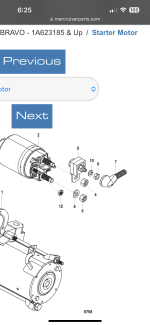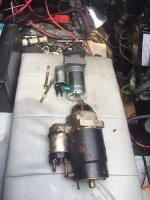I havent attacked the fuse yet, only because t's really difficult to get to, and I'm not a young, or limber (or small) man anymore, but I'm going to replace it soon.
My thoughts on why it worked, remembering i am, let's say, an advanced novice on electrical. First, it worked to jump anywhere into the starting circuit. Since it was low voltage, not no voltage, adding a 12v source is like a booster. I basically bypassed the fuse from a different clean circuit, kinds like through the back door. I fed it from the main 12v block at the helm, which is straight from the battery. I dunno...but it works. It will only be temporary and the fuse will be replaced well before the busy boating season is back, but we do use our boat year round.





















